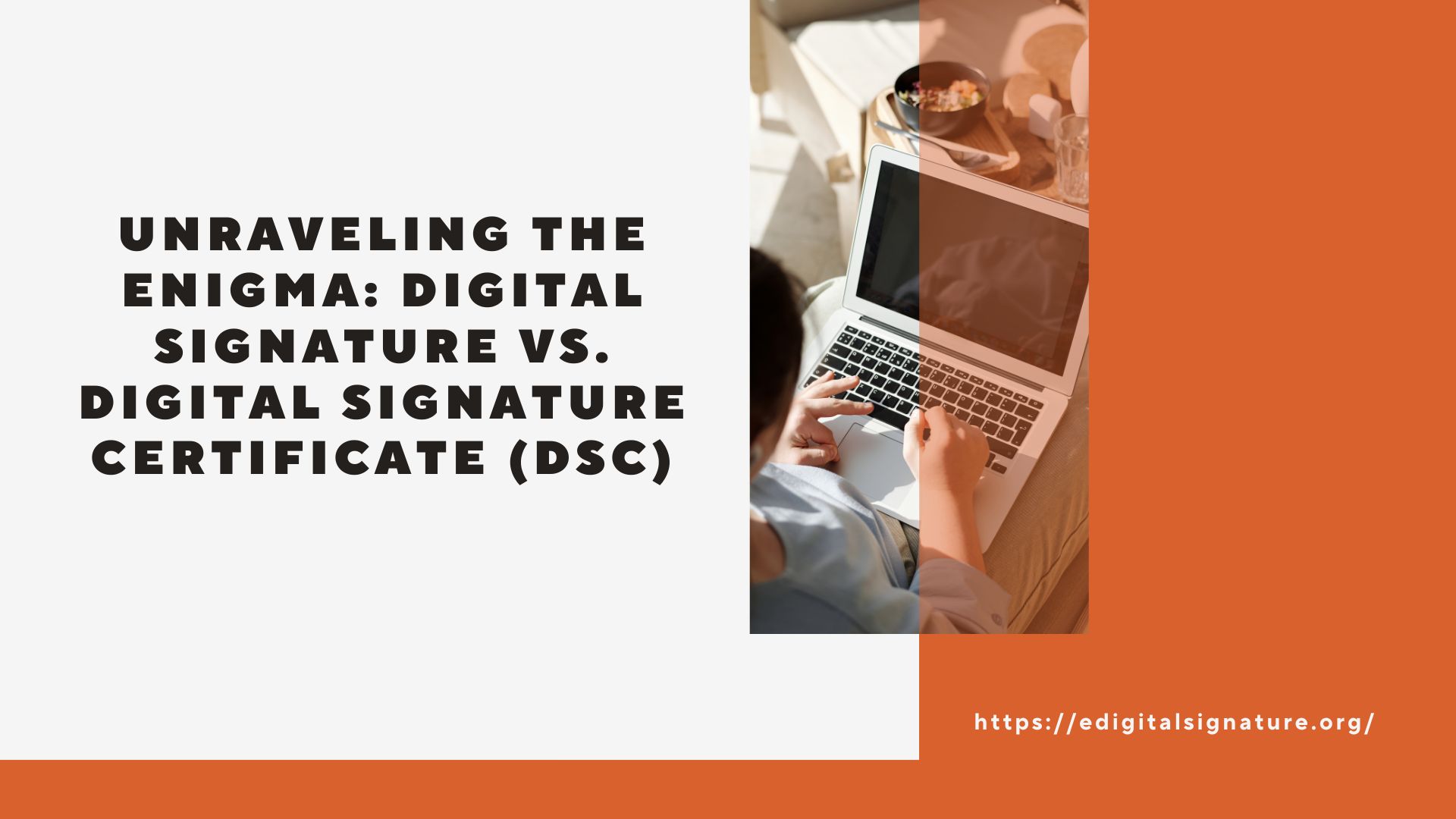
Introduction
In today’s digital age, security is paramount, especially when it comes to online transactions, document authentication, and data integrity. Two terms that are often use interchangeably but serve different purposes are “Digital Signature” and “Digital Signature Certificate” (DSC). Understanding the distinction between these two concepts is crucial for individuals, businesses, and organizations seeking to secure their digital communications and transactions. In this comprehensive article, we will delve deep into the differences between a digital signature and a Digital Signature Certificate.
Digital Signatures: The Essentials
A digital signature is a cryptographic technique use to verify the authenticity and integrity of a digital document or message. It is the electronic equivalent of a handwritten signature on a paper document but offers far greater security and reliability. Digital signatures serve several vital functions:
Authentication:
Digital signatures confirm the identity of the sender or author of a document, ensuring that it has not been tamper with during transmission.
Data Integrity:
They provide a mechanism to detect any unauthorized changes to the document. If even a single character is alter, the digital signature will no longer be valid.
Non-Repudiation:
Digital signatures prevent the sender from denying their involvement in the creation or transmission of a document, making it legally binding.
Efficiency:
They streamline processes by eliminating the need for physical signatures and paper documents, thus reducing administrative overhead.
Security:
Digital signatures are create using cryptographic algorithms, making them extremely difficult to forge or replicate.
How Digital Signatures Work
Digital signatures employ a pair of cryptographic keys: a private key and a public key. The private key is known only to the owner and is use to create the signature, while the public key is available to anyone and is used to verify the signature. The process involves the following steps:
Signing:
The sender’s private key is used to create a unique digital signature for the document. This signature is append to the document.
Verification:
The recipient uses the sender’s public key to verify the signature’s authenticity and integrity. If the verification succeeds, the document is considered valid.
Digital Signature Certificates (DSC): Beyond the Basics
A Digital Signature Certificate (DSC), on the other hand, is a specific type of digital certificate that binds a person’s identity to a pair of cryptographic keys. These certificates are issue by Certifying Authorities (CAs) and serve as a digital identity card in the virtual world. DSCs are typically used for online transactions, filing tax returns, e-tendering, and other legal and financial transactions that require a high level of security and authentication.
Key Characteristics of DSCs
Identity Verification:
Before issuing a DSC, the Certifying Authority conducts a thorough verification process to confirm the individual’s identity. This can involve physical verification of documents and in-person checks.
Role-based Certificates:
DSCs can be issue for different purposes and roles, such as individual, organization, or government, each with its level of security and usage.
Validity Period:
DSCs have a limit validity period, usually one or two years, after which they need to be renewed.
Hardware Tokens:
Some DSCs are stored on hardware tokens (USB dongles) for added security. These tokens require a physical device for access.
Password Protection:
DSCs are typically protected by a password or PIN to prevent unauthorized use.
DSC vs. Digital Signature: The Crucial Differences
Now that we have a clear understanding of both digital signatures and Digital Signature Certificates, let’s highlight the key differences between the two:
Scope of Usage:
Digital signatures can be used for various purposes, including email communications, signing documents, and code authentication. DSCs are primarily used for legal and financial transactions that require a high level of identity verification.
Authentication Level:
DSCs offer a higher level of authentication as they are issued only after stringent identity verification processes. Digital signatures, while secure, do not necessarily involve identity verification to the same extent.
Validity Period:
Digital signatures do not expire, while DSCs have a predefined validity period and need to be renewed.
Storage and Portability:
Digital signatures can be stored on any device, while DSCs may require specific hardware tokens for storage and access.
Legal Implications:
DSCs hold legal weight and are often mandated for specific transactions under local laws and regulations. Digital signatures, while legally recognized in many jurisdictions, may not carry the same level of legal validity as DSCs.
Suggested Read: Class 3 Digital Signature
Conclusion
In a world where digital transactions and communication are ubiquitous, understanding the difference between digital signatures and Digital Signature Certificates is crucial for ensuring security, compliance, and legal validity. Digital signatures provide a versatile tool for authentication and data integrity, while DSCs offer a higher level of identity verification and are essential for specific legal and financial transactions. By choosing the right tool for the right purpose, individuals and organizations can navigate the digital landscape with confidence, knowing their digital interactions are secure and legally binding.

